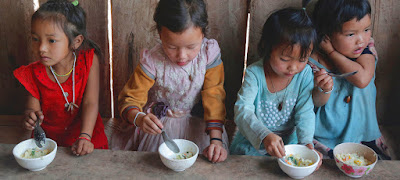#EndPoverty
credits: Elyx Yak
"One of the keys to ending child poverty is addressing poverty in the household, from which it often stems. Access to quality social services must be a priority."
António Guterres, UN, Secretary-General
credits: UN
This year marks the 30th anniversary of the adoption of the Convention on the Rights of the Child (UNCRC) on 20 November 1989. This landmark human rights treaty sets out the civil, political, economic, social and cultural rights of every child, regardless of their race, religion or abilities.
In particular, the Convention recognizes the right of every child to a standard of living adequate for the child’s physical, mental, spiritual, moral and social development. Poverty hurts children’s development and, in turn, leads to lower income and health in adulthood. When child poverty is recognized as a denial of children’s human rights then people in positions of responsibility and power are legally bound to promote, protect and fulfil children’s rights. Above all, it is imperative to recognize and address the specific discriminations experienced by the girl child.
UN Photo/Leonora Baumann
In a world characterized by an unprecedented level of economic development, technological means and financial resources, that millions of persons are living in extreme poverty is a moral outrage. Poverty is not solely an economic issue, but rather a multidimensional phenomenon that encompasses a lack of both income and the basic capabilities to live in dignity.
Persons living in poverty experience many interrelated and mutually reinforcing deprivations that prevent them from realizing their rights and perpetuate their poverty, including:
- dangerous work conditions
- unsafe housing
- lack of nutritious food
- unequal access to justice
- lack of political power
- limited access to health care
2019 Theme:
"Acting Together to Empower Children, their Families and Communities to End Poverty."
It is crucial that children’s participation be recognized as a process and not a one-off event. Too often consultation is mistaken for participation. Whereas the process of consultation gathers children’s views on a particular issue or question, participation means that children actually join in in decision- making.
An alarmingly high number of children are suffering the consequences of poor diets and a food system that is failing them, UNICEF warned today in a new report on children, food and nutrition.
For the first time in 20 years, UNICEF’s flagship report examines the issue of children, food and nutrition, providing a fresh perspective on a rapidly evolving challenge.
The 2019 edition of The State of the World’s Children (SOWC) examines the issue of children, food and nutrition, providing a fresh perspective on a rapidly evolving challenge.
"Despite progress in the past two decades, one third of children under age 5 are malnourished – stunted, wasted or overweight – while two thirds are at risk of malnutrition and hidden hunger because of the poor quality of their diets. At the center of this challenge is a broken food system that fails to provide children with the diets they need to grow healthy."
This report also provides new data and analyses of malnutrition in the 21st century and outlines recommendations to put children’s rights at the heart of food systems.
Children, food and nutrition
UNICEF
"Despite progress in the past two decades, one third of children under age 5 are malnourished – stunted, wasted or overweight – while two thirds are at risk of malnutrition and hidden hunger because of the poor quality of their diets. At the center of this challenge is a broken food system that fails to provide children with the diets they need to grow healthy."
This report also provides new data and analyses of malnutrition in the 21st century and outlines recommendations to put children’s rights at the heart of food systems.
Education:
When child poverty is recognized as a denial of children’s human rights, people in positions of responsibility and power are legally bound to promote, protect and fulfil children’s rights."
The report provides the most comprehensive assessment yet of 21st century child malnutrition in all its forms. It describes a triple burden of malnutrition:
Undernutrition, hidden hunger caused by a lack of essential nutrients, and overweight among children under the age of five, noting that around the world:
• 149 million children are stunted, or too short for their age,
• 50 million children are wasted, or too thin for their height,
• 340 million children – or 1 in 2 – suffer from deficiencies in essential vitamins and nutrients such as vitamin A and iron,
• 40 million children are overweight or obese.
credits: UNICEF/Jacqueline Labrador
- Join the #EndPoverty global campaign.
Everyone can join the campaign on social media by using hashtag #EndPoverty and promoting the call to action to connect with people from around the world who have joined the fight to overcome poverty.
Activities:
Activities and other resources: Learn more here
Ask students to use #EndPoverty to share messages about the International Day for the Eradication of Poverty via social media.
G-Souto
17.10.2019
Copyright © 2019G-Souto'sBlog, gsouto-digitalteacher.blogspot.com®

Children, food and nutrition
UNICEF
Activities:
Activities and other resources: Learn more here
Ask students to use #EndPoverty to share messages about the International Day for the Eradication of Poverty via social media.
G-Souto
17.10.2019
Copyright © 2019G-Souto'sBlog, gsouto-digitalteacher.blogspot.com®

Schools : Intl Day for the Eradication of Poverty : #EndPoverty by G-Souto is licensed under a Creative Commons Attribution-NonCommercial-NoDerivatives 4.0 International License.
sources:
UNICEF/ UN
UNICEF/ UN








No comments:
Post a Comment